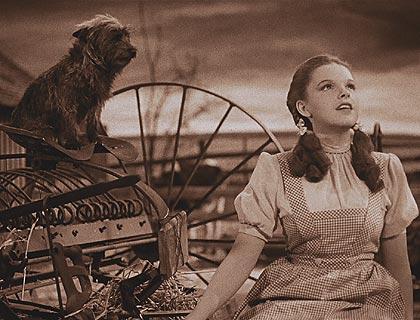From Wikipedia: About five minutes into the film, Dorothy sings the song after failing to get Aunt Em, Uncle Henry, and the farmhands to listen to her story of an unpleasant incident involving her dog, Toto, and the town spinster, Miss Gulch (Margaret Hamilton). Aunt Em tells her to "find yourself a place where you won't get into any trouble". This prompts her to walk off by herself, musing to Toto, "Some place where there isn't any trouble. Do you suppose there is such a place, Toto? There must be. It's not a place you can get to by a boat, or a train. It's far, far away. Behind the moon, beyond the rain...", at which point she begins singing.
Try framing this by reminding your partner that immediately preceding this scene, the adults in Dorothy's life refuse to protect her from Miss Gulch who intends to take Toto away.
In that context, this song is a lovely
For a more intellectual angle, you can try talking about child actors and movie stars in the studio system. Although Judy Garland was about 17 when she sang this and was portraying a young girl, she was already a very experienced performer and had remarkable presence and an astounding, mature voice.
Another historical angle on this is to frame it as a hopeful song during the Great Depression.
It won the Oscar in 1939 for Best Original song.
"When did you first hear this song," is a good one. Or "What did it mean to you growing up?" And then, "What does it mean now?"

